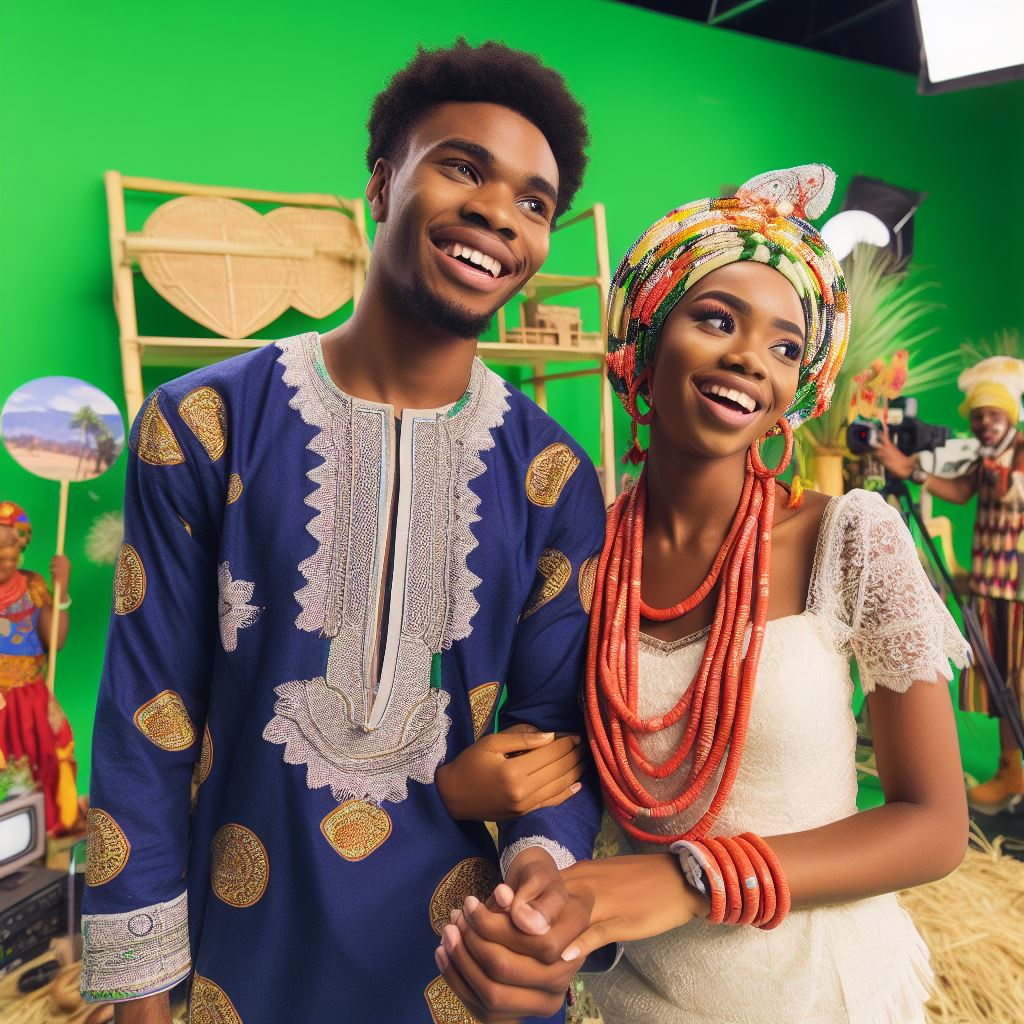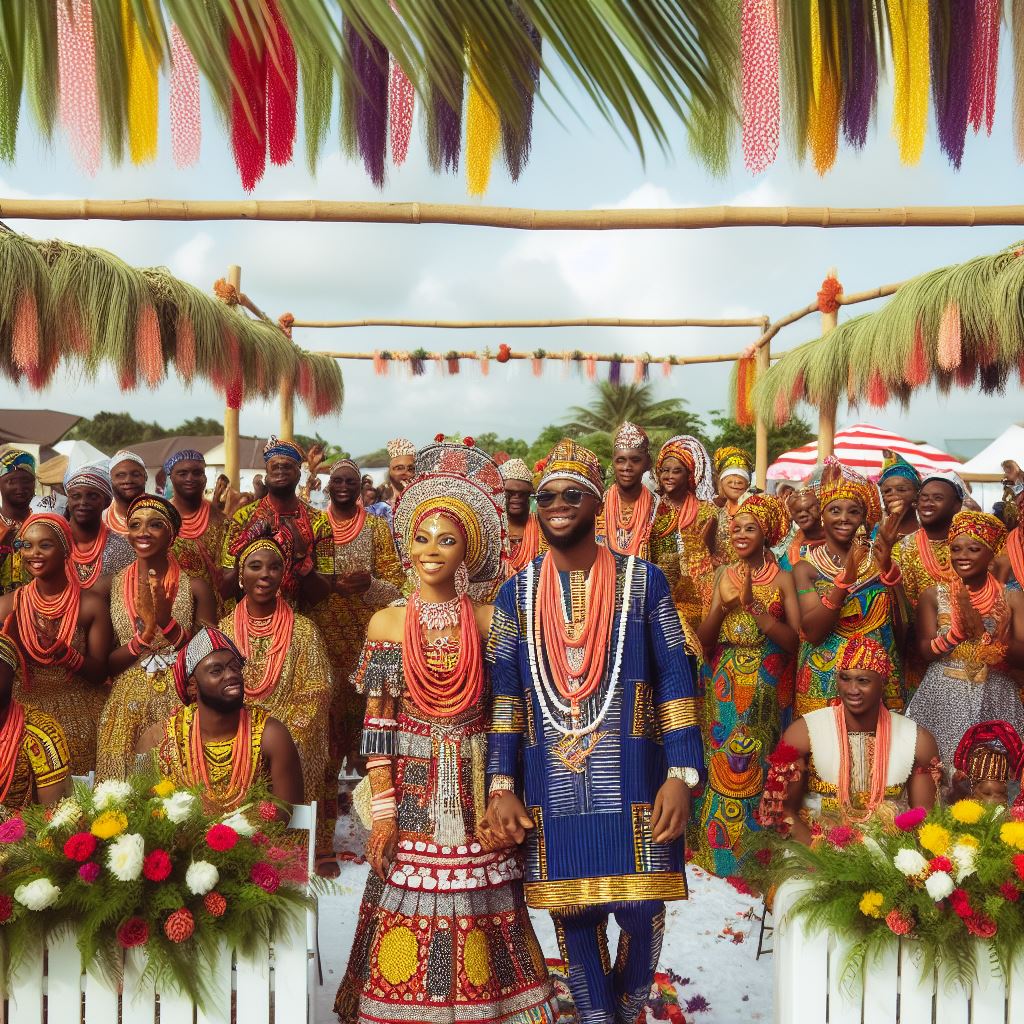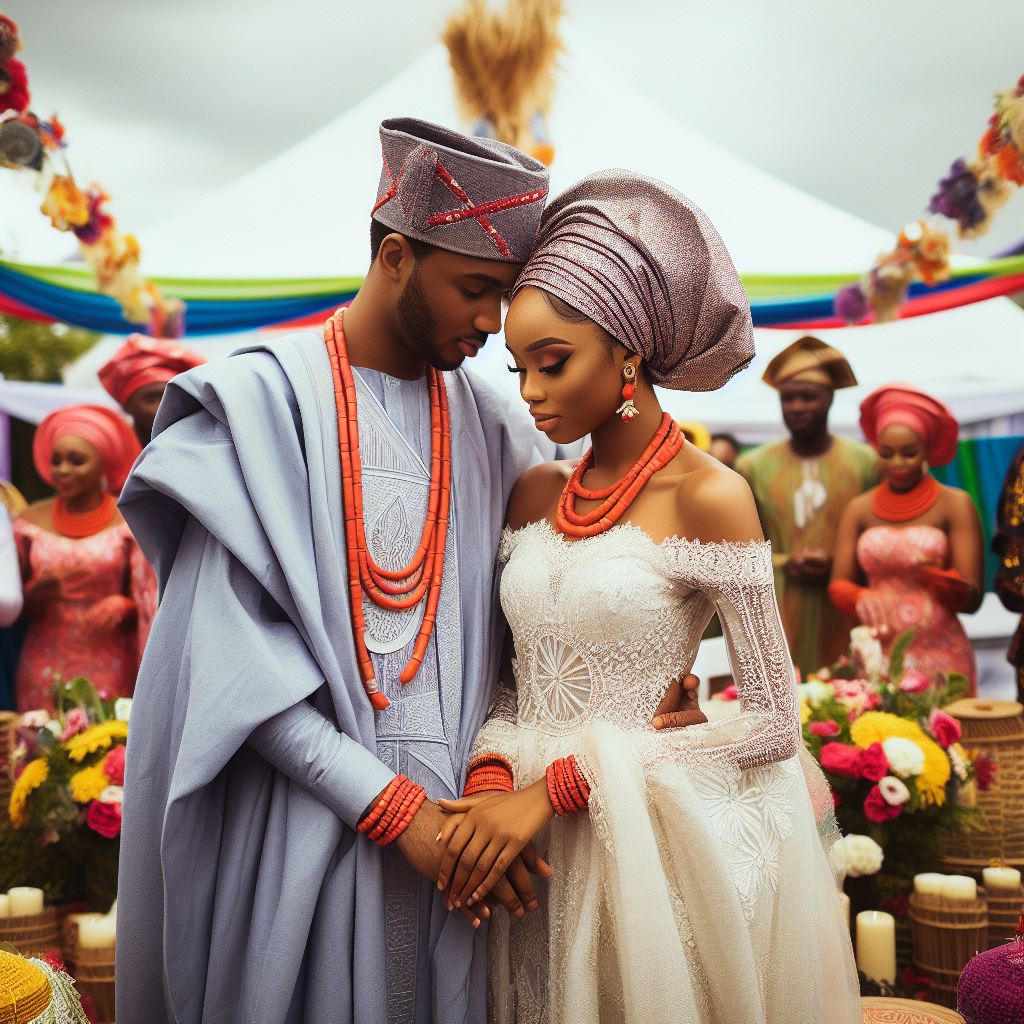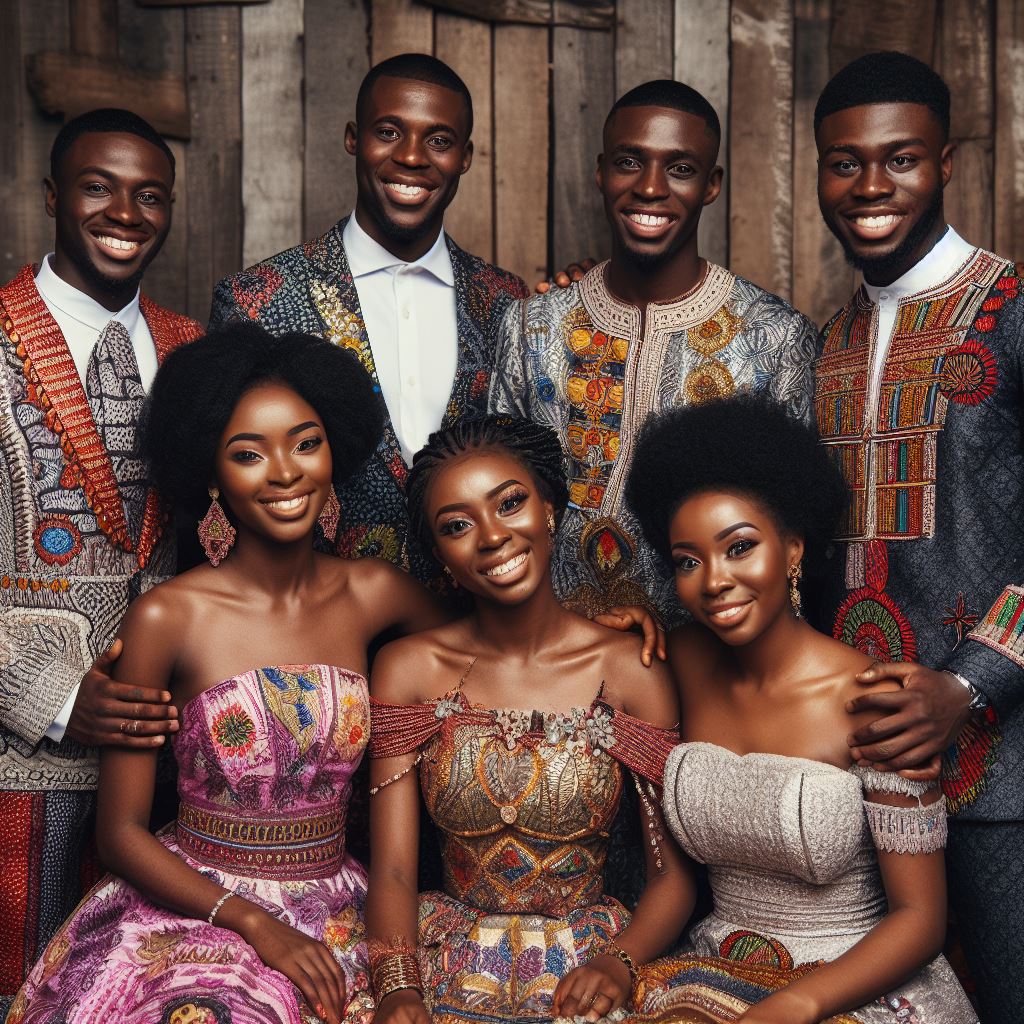Introduction
Marriage in Nigeria is a delicate balance between love and traditions that shape the union. In Nigerian culture, marriage holds great importance.
It is not simply a union between two individuals, but a coming together of families and communities.
In Nigeria, marriage serves as a societal duty, preserving lineages and elevating social status through diverse, tradition-rich customs.
These traditions play a significant role in the decision-making process and the overall success of the marriage.
Importance of marriage in Nigerian culture
Love is also an essential component of marriage in Nigeria. Many individuals desire a union founded on love, companionship, and mutual respect, despite the high regard for traditional values.
Love is seen as the foundation upon which a successful marriage can thrive. However, striking a balance between love and tradition is not always easy.
The traditional expectations placed on individuals can sometimes hinder the growth of love within a marriage.
For instance, the influence of extended family members and societal norms can place pressure on couples, leading to conflicts and discord.
At the same time, embracing tradition can strengthen the marriage bond.
Many Nigerians believe that adherence to customs and traditions creates a sense of stability and cultural identity within the union.
It also fosters a deeper connection with their heritage and ancestors.
Marriage in Nigeria is a complex interplay between love and tradition. While tradition holds great significance, love remains a crucial factor for a successful and fulfilling marriage.
Striking a balance between the two is the key to navigating the challenges and embracing the beauty of Nigerian matrimony.
Traditional Marriage Customs in Nigeria
Description of traditional marriage customs in Nigeria
Nigeria’s rich cultural heritage deeply roots traditional marriage customs, playing a vital role in preserving tradition and uniting families.
Importance of family involvement in the marriage process
One of the most important aspects of traditional marriage in Nigeria is family involvement.
Unlike in Western cultures where the decision to marry lies solely with the couple, Nigerian marriages require the approval and support of both families.
This involvement ensures that the union is seen as a bond between two families, rather than just two individuals.
Typical stages of traditional Nigerian marriage ceremonies
The process of a traditional Nigerian marriage typically involves several stages. Firstly, the groom’s family sends a delegation to the bride’s family to express their intention to marry their daughter.
This delegation often includes the groom’s parents, relatives, and close friends. Their visit serves as an introduction of the groom’s family to the bride’s family.
Next, the bride’s family conducts investigations to ensure that the groom and his family are of good character and have no hidden agendas.
This step is vital to safeguarding the well-being of the bride. If the groom’s family is deemed suitable, the families proceed to the next stage of the marriage process.
Cultural practices and rituals
One of the most significant aspects of traditional Nigerian marriage ceremonies is the emphasis on cultural practices and rituals.
Ethnic groups and locations determine variations, including bride price payment, bride introduction to the groom’s family, and symbolic family union ceremonies.
The payment of the bride price is a customary practice in Nigerian marriages. It signifies the groom’s commitment and ability to care for the bride.
The bride price is usually negotiated between the families and consists of gifts such as money, livestock, or other valuable items.
This practice symbolizes the transfer of responsibility from the bride’s family to the groom.
Another important ceremony is the introduction of the bride to the groom’s family.
This ceremony serves as an official acknowledgment of the union and allows both families to come together in celebration. It is often accompanied by feasting, dancing, and traditional music.
Throughout the various stages of a traditional Nigerian marriage, cultural practices and rituals are upheld with great significance.
These practices serve to honor ancestors, strengthen family ties, and celebrate the couple’s heritage.
They are an integral part of the marriage process, ensuring that the couple’s union is deeply rooted in their cultural identity.
Traditional marriage customs in Nigeria are essential to the country’s cultural fabric.
They reflect the importance of family involvement, the significance of cultural practices, and the preservation of tradition.
These customs create a strong foundation for marriages, ensuring that love and tradition go hand in hand.
Read: Grace, Love, and Unity: Biblical Keys for Marriage
The Role of Love in Nigerian Marriages
Shift towards love-based marriages in modern Nigeria
When it comes to marriage in Nigeria, the role of love is becoming increasingly important.
In modern Nigeria, there has been a shift towards love-based marriages, a departure from the traditional arranged unions of the past.
This shift can be partly attributed to the influence of Western cultures on Nigerian perceptions of love and marriage.
In the past, marriages in Nigeria were primarily based on cultural and traditional expectations.
Families would arrange marriages, considering factors such as social status, family background, and financial stability.
Love was not necessarily a prerequisite for marriage; instead, the focus was on maintaining family honor and ensuring compatibility between the families involved.
However, with the rise of globalization and the exposure to Western ideas, young Nigerians have started to embrace the concept of romantic love in their relationships.
Love has become a driving force, with individuals seeking emotional connection and compatibility in their partners. They want to find someone they genuinely love and who reciprocates that love.
Influence of Western cultures on Nigerian perceptions of love and marriage
The influence of Western cultures, particularly through media, has played a significant role in shaping Nigerian perceptions of love and marriage.
Nigerian youths have been exposed to portrayals of romantic love in movies, music, and literature from the West.
These portrayals often depict love as a strong emotion that transcends societal expectations and overrides traditional norms.
Importance of compatibility and emotional connection in modern Nigerian marriages
As a result, Nigerian youths are increasingly seeking love-based marriages, where love is the foundation of their union.
They are no longer content with arranged marriages or marriages dictated by societal expectations.
Instead, they prioritize emotional connection and compatibility, seeking partners who share their values, interests, and goals.
Changes in societal expectations regarding love and marriage
Furthermore, societal expectations regarding love and marriage have also undergone significant changes.
In the past, people primarily measured a successful marriage by factors like stability, financial security, and childbearing ability, often sidelining love.
However, modern Nigerian society has become more accepting of love-based marriages.
Society now encourages individuals to choose partners based on love and emotional connection, legitimizing romantic love as a reason for marriage.
This change in societal expectations has further fueled the shift towards love-based marriages in Nigeria.
The role of love in Nigerian marriages cannot be understated. There has been a notable shift towards love-based marriages in modern Nigeria, influenced by Western cultures and changing societal expectations.
Compatibility and emotional connection have become essential factors in choosing a partner, and young Nigerians are increasingly prioritizing love in their marriages.
Love is now seen as a legitimate reason for marriage, marking a significant departure from the traditional arranged unions of the past.
Read: The Beauty of Commitment: Top Bible Verses on Marriage
Learn More: Tips for Honouring Your Spouse in Daily Nigerian Family Life
Delve into the Subject: Marriage and Work-Life Balance in Nigeria Today
Challenges and Conflicts in Nigerian Marriages
In Nigeria, couples frequently confront challenges and conflicts when love clashes with deep-rooted traditional values within the institution of marriage.
1. Issues arising from the clash between love and traditions
- Pressure to conform to cultural norms and expectations can create tension between spouses.
- Forced marriages or marriages arranged by families can lead to dissatisfaction and resentment.
- Conflict between individual desires for love and the societal emphasis on fulfilling traditional obligations.
2. Impact of arranged marriages on marital happiness
- Arranged marriages may lack the foundation of love and compatibility, leading to unhappiness.
- Limited choice in a life partner can result in a lack of emotional connection and understanding.
- Marital conflicts can arise due to differing expectations and desires between the spouses.
3. Gender roles and expectations within Nigerian marriages
- Nigerian marriages often follow traditional gender roles, where men are expected to be the primary providers.
- These roles can lead to power imbalances and conflicts over decision-making and household responsibilities.
- Expectations of obedience from wives can hinder personal growth and create resentment.
4. Conflict resolution and communication challenges faced by Nigerian couples
- Cultural norms that discourage open expression of emotions and opinions can hinder effective communication.
- Lack of communication skills and conflict resolution strategies can escalate tensions.
- Traditional beliefs that prioritize family reputation can deter couples from seeking professional help.
Nigerian marriages face significant challenges and conflicts due to the clash between love and traditions.
Arranged marriages, gender roles, and communication challenges contribute to marital dissatisfaction and unhappiness.
To build stronger and more successful marriages, there is a need for a balance between cultural traditions and individual desires.
Read: Marriage and Divorce: What the Bible Really Says
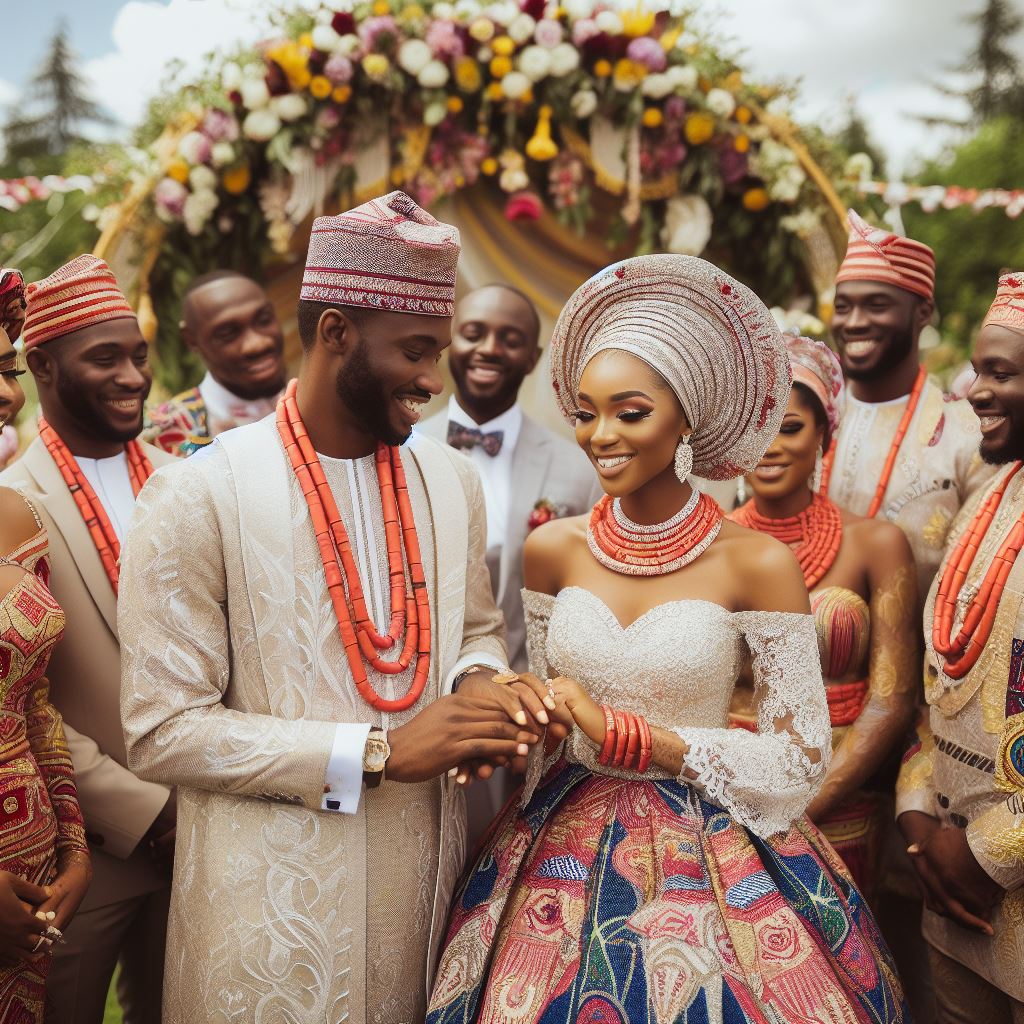
Celebrating Love and Tradition in Nigerian Marriages
Strategies for maintaining the balance between love and tradition
- Understanding the importance of both love and tradition in a Nigerian marriage.
- Recognizing the challenges that may arise when trying to balance these two elements.
- Setting clear boundaries and expectations from the start of the relationship.
- Discussing cultural expectations and traditions openly and honestly with your partner.
- Seeking support and advice from older, married relatives who have successfully balanced love and tradition.
- Continuously assessing and reassessing the balance between love and tradition as the marriage evolves.
- Being open to compromise and finding a middle ground that satisfies both partners’ needs.
- Regularly communicating with your partner about the challenges and successes of balancing love and tradition.
- Being willing to adapt and adjust traditions to align with modern realities and changing times.
- Remembering that love and tradition should complement each other, rather than conflicting with one another.
Importance of compromise and open communication in Nigerian marriages
- Understanding that compromise is essential for a successful marriage that embraces both love and tradition.
- Recognizing that compromise may require letting go of certain traditions or adjusting them to fit the relationship.
- Being open to listening to your partner’s perspective and finding solutions that work for both of you.
- Avoiding stubbornness or rigidity when it comes to upholding traditions, as this can lead to conflicts.
- Setting aside time for regular, open communication to discuss any potential issues or concerns.
- Encouraging both partners to express their desires, concerns, and expectations regarding love and tradition.
- Fostering a safe and non-judgmental environment that allows for honest and respectful communication.
- Acknowledging that compromise may require mediated discussions or seeking professional guidance if necessary.
- Understanding that compromise is an ongoing process and may require adjustments as the relationship evolves.
- Celebrating the successes of compromise and recognizing the positive impact it can have on the relationship.
Embracing cultural heritage while adapting to modern realities
- Recognizing the value and importance of cultural heritage in Nigerian marriages.
- Understanding that cultural traditions can provide a sense of identity, belonging, and connection.
- Being open to adapt traditional practices to align with modern values and realities.
- Weighing the significance of certain traditions against their potential negative impact on the relationship.
- Seeking a balance between maintaining cultural heritage and embracing modern attitudes and beliefs.
- Encouraging open discussions about the relevance and meaning of certain traditional practices.
- Being mindful of the potential generational gaps in attitudes towards tradition and finding common ground.
- Finding creative ways to incorporate cultural traditions into the marriage without compromising personal happiness.
- Understanding that embracing cultural heritage is a personal choice and different couples may have different approaches.
- Celebrating the moments when love and tradition intertwine harmoniously, creating a unique and meaningful marital experience.
Role of extended family support in Nigerian marriages
- Understanding that Nigerian marriages often involve the whole extended family, not just the couple.
- Recognizing the potential benefits and challenges that come with extended family involvement.
- Seeking support from trusted family members who can provide guidance and advice.
- Being open to hearing different perspectives and respecting the wisdom of elders.
- Understanding that extended family support can provide a strong foundation and sense of community.
- Recognizing the potential conflicts that may arise when extended family expectations clash.
- Setting boundaries with extended family members to maintain a healthy balance in the marriage.
- Being clear about the couple’s values and priorities when communicating with extended family members.
- Seeking compromises that satisfy both the couple’s desires and the expectations of the extended family.
- Acknowledging and appreciating the role of extended family support in strengthening Nigerian marriages.
Ultimately, the role of extended family support in Nigerian marriages reflects the rich cultural diversity and values of the country.
Read: The Song of Solomon: Exploring Love and Marriage
Conclusion
Nigerian marriages are a delicate balance between love and tradition. Throughout this blog section, we have examined the various aspects of this balance and its implications.
It is evident that maintaining cultural values is significant in Nigerian marriages. These traditions provide a sense of identity and belonging, connecting individuals to their roots.
However, it is crucial to prioritize love and happiness in these unions. Love should be the foundation upon which marriages are built, ensuring a fulfilling and joyful partnership.
As our society evolves, it is essential for individuals to embrace the changing dynamics of Nigerian marriages. This means challenging societal expectations and norms that may hinder personal happiness.
Therefore, I encourage everyone to be open-minded and accepting of new ideas and perspectives in relationships. Let us create an environment where love and tradition can coexist harmoniously.
By embracing the evolving dynamics of Nigerian marriages, we can build a future where love and cultural values thrive, creating lasting and meaningful unions.

